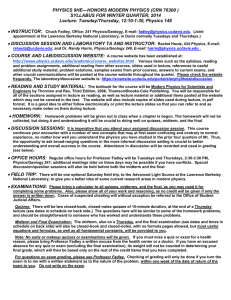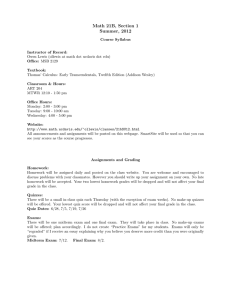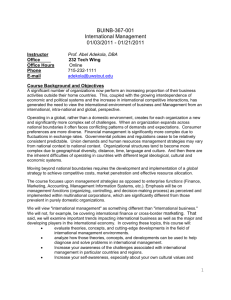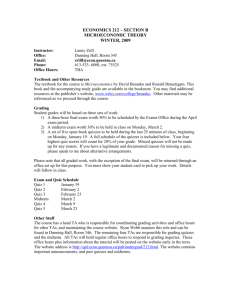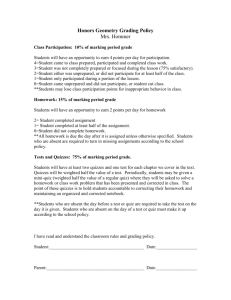PHYSICS 9D, SECTION C-
advertisement
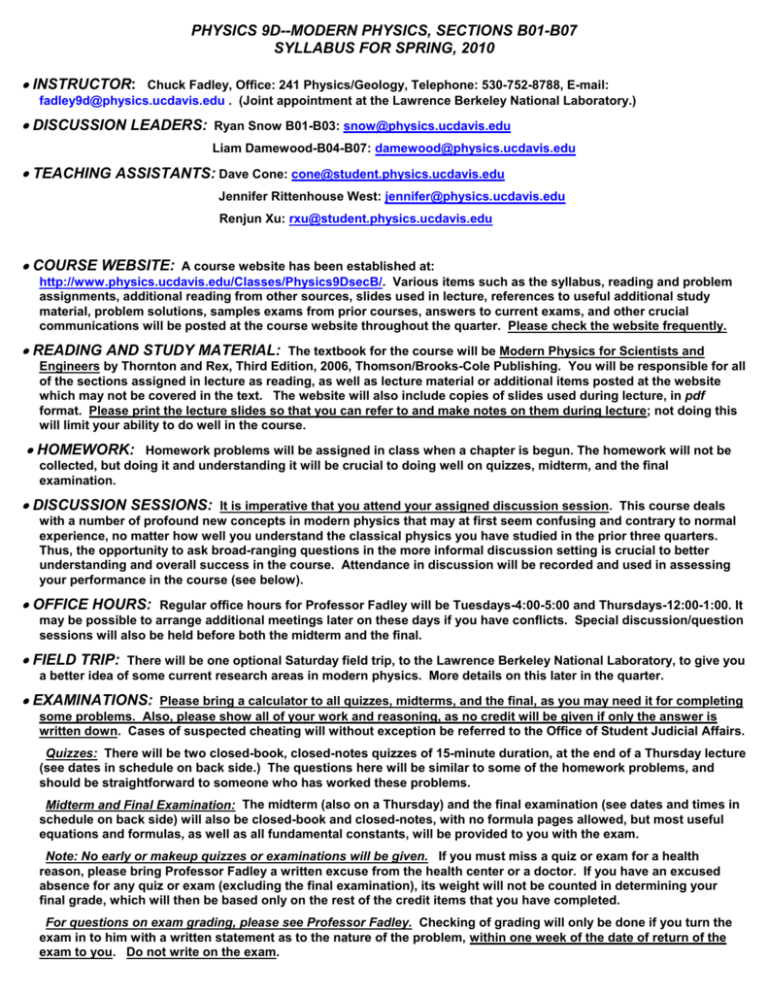
PHYSICS 9D--MODERN PHYSICS, SECTIONS B01-B07 SYLLABUS FOR SPRING, 2010 INSTRUCTOR: Chuck Fadley, Office: 241 Physics/Geology, Telephone: 530-752-8788, E-mail: fadley9d@physics.ucdavis.edu . (Joint appointment at the Lawrence Berkeley National Laboratory.) DISCUSSION LEADERS: Ryan Snow B01-B03: snow@physics.ucdavis.edu Liam Damewood-B04-B07: damewood@physics.ucdavis.edu TEACHING ASSISTANTS: Dave Cone: cone@student.physics.ucdavis.edu Jennifer Rittenhouse West: jennifer@physics.ucdavis.edu Renjun Xu: rxu@student.physics.ucdavis.edu COURSE WEBSITE: A course website has been established at: http://www.physics.ucdavis.edu/Classes/Physics9DsecB/. Various items such as the syllabus, reading and problem assignments, additional reading from other sources, slides used in lecture, references to useful additional study material, problem solutions, samples exams from prior courses, answers to current exams, and other crucial communications will be posted at the course website throughout the quarter. Please check the website frequently. READING AND STUDY MATERIAL: The textbook for the course will be Modern Physics for Scientists and Engineers by Thornton and Rex, Third Edition, 2006, Thomson/Brooks-Cole Publishing. You will be responsible for all of the sections assigned in lecture as reading, as well as lecture material or additional items posted at the website which may not be covered in the text. The website will also include copies of slides used during lecture, in pdf format. Please print the lecture slides so that you can refer to and make notes on them during lecture; not doing this will limit your ability to do well in the course. HOMEWORK: Homework problems will be assigned in class when a chapter is begun. The homework will not be collected, but doing it and understanding it will be crucial to doing well on quizzes, midterm, and the final examination. DISCUSSION SESSIONS: It is imperative that you attend your assigned discussion session. This course deals with a number of profound new concepts in modern physics that may at first seem confusing and contrary to normal experience, no matter how well you understand the classical physics you have studied in the prior three quarters. Thus, the opportunity to ask broad-ranging questions in the more informal discussion setting is crucial to better understanding and overall success in the course. Attendance in discussion will be recorded and used in assessing your performance in the course (see below). OFFICE HOURS: Regular office hours for Professor Fadley will be Tuesdays-4:00-5:00 and Thursdays-12:00-1:00. It may be possible to arrange additional meetings later on these days if you have conflicts. Special discussion/question sessions will also be held before both the midterm and the final. FIELD TRIP: There will be one optional Saturday field trip, to the Lawrence Berkeley National Laboratory, to give you a better idea of some current research areas in modern physics. More details on this later in the quarter. EXAMINATIONS: Please bring a calculator to all quizzes, midterms, and the final, as you may need it for completing some problems. Also, please show all of your work and reasoning, as no credit will be given if only the answer is written down. Cases of suspected cheating will without exception be referred to the Office of Student Judicial Affairs. Quizzes: There will be two closed-book, closed-notes quizzes of 15-minute duration, at the end of a Thursday lecture (see dates in schedule on back side.) The questions here will be similar to some of the homework problems, and should be straightforward to someone who has worked these problems. Midterm and Final Examination: The midterm (also on a Thursday) and the final examination (see dates and times in schedule on back side) will also be closed-book and closed-notes, with no formula pages allowed, but most useful equations and formulas, as well as all fundamental constants, will be provided to you with the exam. Note: No early or makeup quizzes or examinations will be given. If you must miss a quiz or exam for a health reason, please bring Professor Fadley a written excuse from the health center or a doctor. If you have an excused absence for any quiz or exam (excluding the final examination), its weight will not be counted in determining your final grade, which will then be based only on the rest of the credit items that you have completed. For questions on exam grading, please see Professor Fadley. Checking of grading will only be done if you turn the exam in to him with a written statement as to the nature of the problem, within one week of the date of return of the exam to you. Do not write on the exam. GRADING: Your final grade will be computed as follows: Discussion section attendance: Quizzes (two): Midterm (one): Final (comprehensive): 5% 15% 30% 50% 100% Grading will be based upon a curve appropriate to this course, with a letter grade being assigned only at the end of the quarter. Means and standard deviations will be calculated for the quizzes and midterms and posted at the website to give you some idea as to how you are doing. TENTATIVE COURSE SCHEDULE: TUESDAY THURSDAY No class 3/25--No class-University closure Chapter 1—Physics at a turning point--1900 2 3/30 Chapter 2—Special Relativity 4/1 Chapter 2—(continued) 3 4/6 Chapter 15—General Relativity 4/8 Chapter 3—Key Expts. to Quantum Theory QUIZ #1 4 4/13 Chapter 4---Atomic Structure 4/15 Chapter 4—(continued) 5 4/20 Chapter 5—Waves and Quantum Mech. 4/22 Chapter 6—Quantum Mechanics 6 4/27 Chapter 6—(continued) 4/29 MIDTERM 7 5/4 Chapter 7—Hydrogen Atom 5/6 Chapter 7—(continued) 8 5/11 Chapter 8—Many-electron Atoms 5/13 Chapter 8—(continued) 9 5/18 Chapter 8—(continued) Chapter 10—Chemical Bonding, the Laser 5/20 Chapter 10—(continued) QUIZ #2 10 5/25 Chapter 13—Nuclei and Nuclear Energy 5/27 Chapter 13—(continued) 11 6/1 Chapter 14—Elementary Particles 6/3—Last lecture Chapter 14 and review Week No. 1 FINAL EXAMINATION: Wednesday, June 9, 6:00-8:00 PM, Roessler 66. Covering all assigned reading and problems, plus any other material treated in lecture. FIRST READING AND PROBLEM ASSIGNMENTS: Chapter 1—Classical physics to 1900 2—Special relativity Reading All Questions/Problems None—a review of classical physics All except 2.9, plus 12.6 on radioactive decay Probs. In Chap. 2: 3,4,13,24,25,27,32,37,40, 51, 54,55,57,68,76,80,82,86,92, plus prob. 12.26
